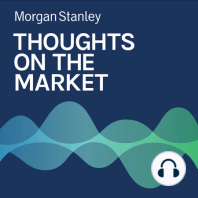3 min listen

Mixed Signals for Asia and Emerging Markets
Mixed Signals for Asia and Emerging Markets
ratings:
Length:
4 minutes
Released:
Apr 19, 2024
Format:
Podcast episode
Description
Japan and India are currently set to lead growth in these markets, but a higher-for-longer rate environment in the U.S. could favor China, Hong Kong and others, according to our analyst.----- Transcript -----Daniel Blake: Welcome to Thoughts on the Market. I'm Daniel Blake from Morgan Stanley's Asia & Emerging Market Equity Strategy Team. Along with my colleagues bringing you a variety of perspectives, today I'll discuss whether U.S. macro resilience is too much of a good thing when it comes to its impact on Asia's equity markets.It's Friday 19th of April at 10am in Singapore.Our U.S. economics team has substantially lifted its forecast for 2024 and 2025 GDP growth following strong migration boosted activity and employment trends. Recent inflation readings have been bumpy, but our team still sees it moderating over the summer as core services and housing prices cool off. While the market has been focused on this silver lining of stronger global growth, the clouds are rolling in from expectations of a shallower and later easing of global monetary policy.Our team now believes that the first Fed rate cut won't come until July but does see two additional cuts coming in November and December. We've made similar adjustments in our outlook for Asia-ex-China's monetary policy easing cycle, seeing it coming later and shallower. Meanwhile, in Japan, our economists now expect two further hikes from the Bank of Japan -- in July this year, and again in January next year -- taking policy rates up to 0.5 per cent.But how does all this leave the Asia and EM equity outlook? In a word, mixed.We see this driving more divergence within Asia and EM, depending on how exposed each market is to stronger global growth, a stronger U.S. dollar or impacted by higher interest rates. On the positive side, Taiwan, Japan, Mexico, and South Korea have the most direct North American revenue exposure. And for Japan, the strong US dollar is also positive through the translation of foreign revenues back at this historically weak yen. However, in the short run, we do need to be mindful of any price momentum reversal as April is normally seasonally weak, and we do see dollar-yen approaching 155. So, any FX (foreign exchange) intervention could sharpen a price momentum reversal.Next up, we're paying close attention to India's equity market, where we have a secularly bullish view. India has remained resilient to date, consistent with our thesis that macro stability has become a key driver of the bull market. And this is in sharp contrast to prior cycles. For example, during the Taper tantrum of 2013, where India saw a sudden and sharp bear market as Fed expectations shifted.On the negative side then, we are seeing a breakdown in correlations of some markets with these higher Fed funds expectations, including in Indonesia and Brazil where policy space is being constrained, and in Australia where valuations were pushed up on hopes of an RBA easing cycle that won't come until next year in our view.So, this is indeed a mixed picture for Asia and EM, but we retain our core views that market leadership will continue coming from Japan and India through 2024. And so, what's the risk from here? The larger risk to Asia and EM markets, we think, comes from an even more inflationary and hawkish scenario where the Fed is forced to recommence rate hikes, ultimately bearing the risk of driving a hard landing to bring inflation back to target.In this scenario, we could see a pivot in leadership away from markets with high US revenue exposure, such as Taiwan and Japan, towards more domestically oriented and resilient late cycle markets, such as an emerging ASEAN partner, and potentially China and Hong Kong -- if additional stimulus is forthcoming there.Thanks for listening. If you enjoyed the show, please leave us a review wherever you listen to podcasts and share Thoughts on the Market with a friend or colleague today.
Released:
Apr 19, 2024
Format:
Podcast episode
Titles in the series (100)
Mike Wilson: 3 Summer Surprises Investors Could Be Missing by Thoughts on the Market